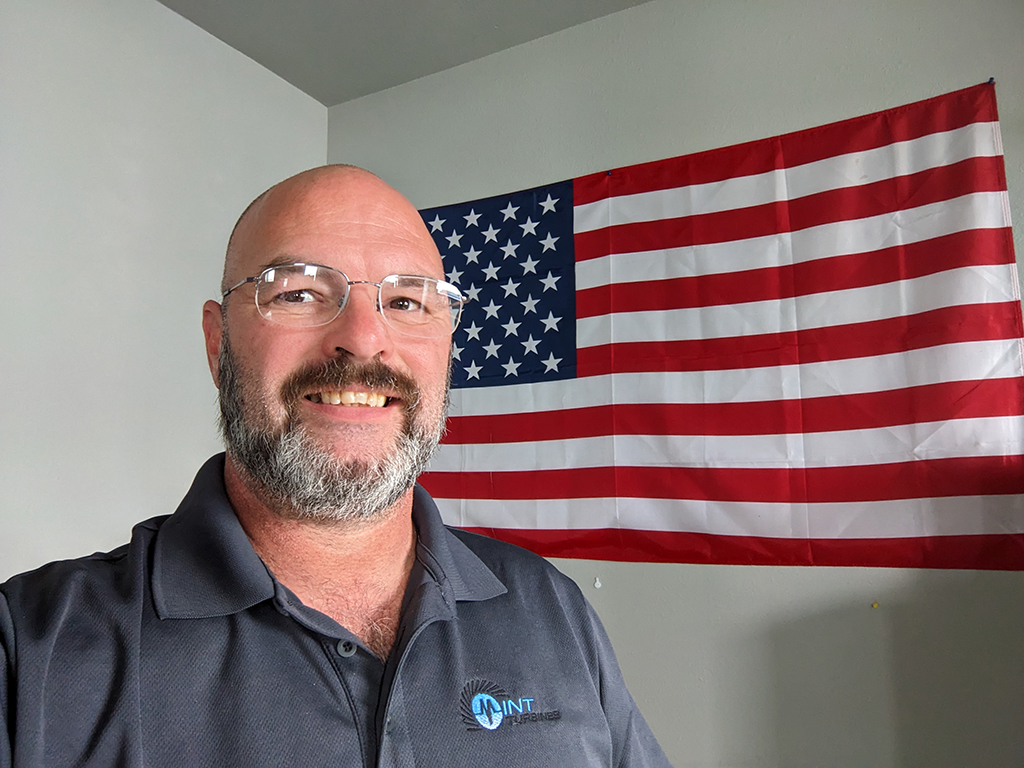
Bobby Moffitt, a father and key player in Mint Turbines’ success, started at Mint Turbines in 1995. His career has let him play many roles in the aerospace and aviation industry, leading him to the role of Quality Assurance Manager. Bobby ensures the company meets different regulations and policies, as safety is paramount in the industry. Learn more about Bobby with our Q&A below.
How did you get started in the aerospace and aviation industry?
Well, I started getting into aerospace when I was 16. As soon as I graduated high school, I worked for a couple of years at an airframe shop in the town I grew up in. I’m relatively local. I grew up just 30 miles from here in Wellston.
How have you seen Mint Turbines grow since you started?
When I started, I referred to it as a mom-and-pop shop. It was privately owned, and we were happy if we worked on ten engines a year. Of course, it made the people grow close. Seeing the growth throughout the years, Mint has steadily grown to where it is now, with almost 60 employees and roughly four times the working space. What keeps a person here is the people we work with, the employees and the management we have. Our goals line up, and it’s just an awesome place with a bunch of awesome people.
What does a day at Mint Turbines look like as a Quality Assurance Manager?
It’s totally different every day for the most part, and that’s part of what I enjoy about it. You never know what to expect day-to-day. The main focus of my job is to keep everybody in line with different regulations, whether it’s FAA, ISO compliance, AS compliance, etc. Things are constantly changing, especially with growth and expansion. All your policies have to expand and grow with that. The day-to-day work varies—there is a lot of paperwork. I take care of all the engine log books and records like that, ensure they’re completed, and everything’s well documented and answer questions for the guys on the floor. I answer questions on interpreting technical data when needed.
Why is it important to have somebody as a Quality Assurance Manager in the overall operation?
For the shop, safety is number one. We work in an industry where safety is paramount, and people’s lives are on the line. Anytime you’re dealing with aircraft, quality and safety go hand in hand. If you build a safe, quality product, people are less likely to get hurt. Aviation companies, or any company, could not survive without quality control. Everything we do centers around the quality assurance of the product. Every product you’re putting out the door has to meet the customer’s expectations, whoever that customer might be.
What is your favorite part about your job and working at Mint Turbines?
By far, what’s kept me here this long is the people. I love what I do. I have a passion for it. After 28 years, I look forward to getting up and coming to work in the morning. I’ve always loved aviation and the people that work here. I would compare it to a family. We spend all day at work together, and there are times we spend weekends together. We help each other out even outside of the shop. Everybody knows the employees, their family members, and their kids. A lot of them are local, so kids play ball games together and things like that.
Are there any specifically memorable projects that you have worked on?
A big project was obtaining our ISO and AS registration for the AS 9100 and the AS 91-10 standards. Quite a few of us had our hands in on that one. Anytime a company grows and brings on new engine lines, it’s remarkable to see how that comes together. I’ve been involved in accident investigations, FAA, and NTSB in the past for projects that I found interesting.
What steps do you take throughout the day to ensure that inaccuracies are caught and corrected?
Yeah, we have a staff of quality inspectors who inspect the part that is going in the engine as they’re disassembling or assembling it. We have quality progressive inspectors standing there with them to inspect their work as they go. The technician will assemble a component and fill out his paperwork, then that component gets reviewed by a quality inspector. They have to sign off on the paperwork before moving on to the next phase. Documentation is critical, any key points of interest have an inspection point that gets inspected for product safety. We have a tool control program that monitors our tooling, how it’s used, how it’s stored and all that good stuff.
What do you do when you’re not at work?
I spend a lot of time with my four grown kids and three grandkids. One grandkid is on the way! Over the last few years, my wife and I built our own house on a farm. We have the little hobby farm that keeps me busy. Outside of that, I’m always helping somebody do something like remodeling houses and fixing things around the house. It keeps me busy in the evenings and all weekend.
